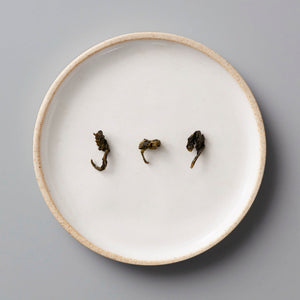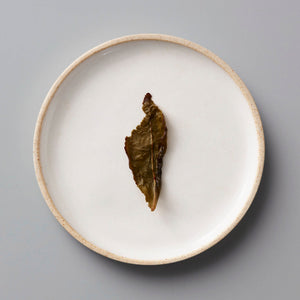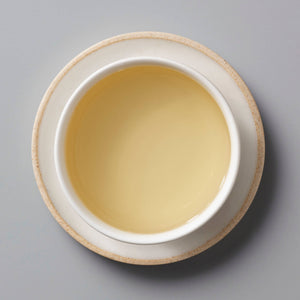Your Cart is Empty



Sold out
ANXI TGY | oolong
$4.00 - $72.00
ANXI TGY is a qing xiang ("light fragrance") tieguanyin from the outskirts of Anxi county, Fujian province, China. This tea is a classic representation of light oxidation tieguanyin—only without the taint of unsafe synthetic fertilizer most TGY is rife with (owing to a surge in popularity through the late 90's when farmers desperate to increase yield over-used farming chemicals and depleted the soils). Today, tea gardens in Anxi-proper are still recovering. Alan, our TGY maker, grows well outside this zone.
Tieguanyin is the name of the cultivar—a small leaf sinensis plant that performs well at high elevation (it's popular in Taiwan, where the plants were transplanted from Fujian). Alan's garden lies at 1,000 meters, and his teas carry all the complexity of high elevation plants due to his agrochemical-free farming, nutrient-rich soils, and expert producing hand.
ANXI TGY is processed in the modernist low-oxidation style (qing xiang—"light fragrance"). Where heavily oxidized tieguanyin requires several rounds of bruising, roasting, and rolling, qing xiang TGY is defined by a process called ti xiang ("magnify fragrance"). This step sees the raw leaf tumbled in rotating steel barrels with fans blowing air at either end. This simultaneously withers and oxidizes the tea, and encourages rapid bruising to release liquid compounds that, once dried, are responsible for this tea's aroma, sweetness, and tang. Finally, the leaves are packed in small cloth bags and hand-rolled to the signature crinkle shape of TGY. Skilled qing xiang TGY craftspeople achieve a slightly heavier bruise along the edges of the leaves, apparent on the dry leaf in faint red streaks.
This lot is purposefully mild, emphasizing the natural profile of Alan's clean leaves and presenting ample sugars and florality in the cup. Lovers of tangy TGY will appreciate our project version. Alan's expert timing and manual rolling produces a darker yellow liquor with more to offer (relative to bland, nuclear green versions produced on dead soils closer to central Anxi). Flash steep with medium-hot water for vegetal sweetness. Longer steeps will produce a heartier finish with more flowers and subtle tannins.
vintage — spring '18
style — tieguanyin ("iron goddess of mercy")
cultivar — tieguanyin
region — Anxi, Fujian, China
locale — Xing Xi (兴溪) tea farm
elevation — 1000 meters
producer — Alan Wang
nomenclature — tie(铁) "iron" | guanyin (观音) "bodhisattva of mercy"
STEEPING PARAMETERS
(use freshly boiled spring water)
modern, large format
[300 ml+ vessel — BOLI, large teapot]
4 grams — 185°F (85°C) — 3 minutes
traditional, small format
[150 ml- vessel — gaiwan, small teapot]
8 grams — 185°F (85°C) — 10 seconds
+10-15 seconds each additional steep



